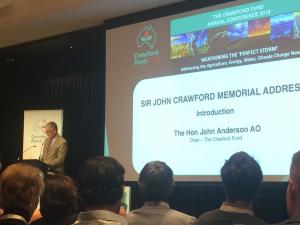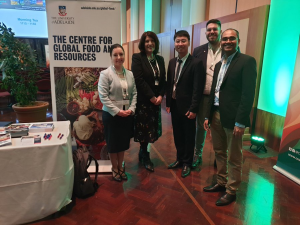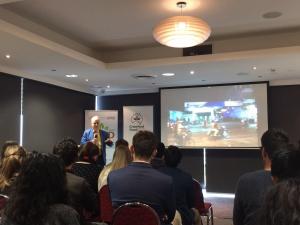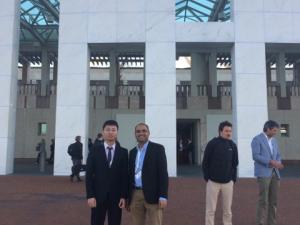Reflections from the 2019 Crawford Fund Conference
Blog post by Anh Duc Nguyen
Reflections from the 2019 Crawford Fund Conference
The inspiration for this year’s Crawford Fund Conference, ‘Weathering the Perfect Storm’ was Sir John Beddington’s prediction of a perfect storm a decade ago. I was honoured to be one of the young scholars chosen from across Australia after a competitive selection process to attend the conference. The conference was held in The Parliament House in Canberra from 12th to 14th August 2018.
This year the conference focused on the significant impacts of climate change on agriculture, energy, and water systems and how different governments, research agencies, industries, and farmers have been trying to resolve the problems. For example, with the current energy intensive practices agriculture accounts for 14% of total greenhouse gas emissions globally.
The first keynote speaker, Prof Sir Charles Godfray, opened the morning session by reemphasizing that the prediction of ‘perfect storm’ was still on track to happen. However, he was more positive about our ability to make changes to address the third wave of Malthusian pessimism. The coming challenges – growing demand, hunger and over- and under- nutrition, agricultural pressure and water scarcity will see more frequent climate and geopolitical shocks. The modelling being conducted in the Oxford Martin School which he described, was trying to answer the questions of what would the outcomes be if “we all ate healthily?’. Sir Godfray stressed that there needs to be another green revolution that considers the environment as a critical central point in its design and implementation which will help in averting a global crisis.
The next session was entitled ‘Weathering and Halting the Perfect Storm’ and the key note address was delivered by Dr Bruce Campbell, leader of the CGIAR CCAFS (Climate Change, Agriculture and Food Security) Program. He stated that “farming as we know it will not be possible under the current system” and the current agricultural technologies are not enough to take us all the way towards our goals. He emphasized the need to improve climate innovation, adoption, and change, particularly keeping in mind the impacts on 500 million global smallholder farmers. This was followed by Prof Alice J. Ferrer on climate-smart villages (CSV), who gave examples of how climate-smart agriculture is being integrated into existing farming systems to transform smallholder farming food systems in Laos, Vietnam and the Philippines. This was followed by the presentation of Dr Di Mayberry, CSIRO who picked up a theme introduced earlier by Dr Campbell, of reducing GHG emissions from red meat production in Australia and developing countries through better land management, input-use efficiency and carbon sequestration.
The last morning session was ‘Crops, Drops and Climate Challenge’ introduced by the keynote address of Dr Ajay Mathur, Director of the Energy and Resources Institute in India. He talked about using energy efficiency to address the ‘perfect storm’ and reminded us of the unintended consequences of past actions, in this case the ‘Green Revolution’ which had resulted in much greater crop yields, but also much greater water and energy use. Dr Jim Woodhill, from DFAT followed and he reminded us that 90% of freshwater in the South Asia is already used for irrigation. He highlighted the need for cross-institutional dialogue to make transformational changes in farming systems. In his case study on the Lower Mekong Basin, Dr Oudom Phonekhampheng gave an example of finding solutions for fish passages under infrastructure development in the Mekong, of the interaction between science research, engineering innovations and farmers to create change was emphasized.
The afternoon session was on ‘Circular Food Systems’ and Dr Aditi Mukherji's (International Water Management Institute) presentation emphasised the importance of policy settings. She stated that to address climate change, global policies were critical but for water management more local policies were required. Dr Mukherji’s address was followed by two supporting case studies. The first by Marc Noyce from Biofilta, a private company supporting the growth of urban farming, under space constraints. The company is now working towards using he success in Australia of a low cost, low tech urban farming system to Tuvalu. The second case study, presented by Eric Huttner of Australian Centre for International Agricultural Research (ACIAR) on behalf of Anjela Manjichi was on an ACIAR-funded project SIMLESA (Sustainable Intensification of Maize-Legume Systems for Food Security in Eastern and Southern Africa), which has been working with different sustainable intensification options for improving maize and legume productivity.
The last session was presented by Sarah Barker from Minter Ellison and she dramatically described how climate change is already firmly embedded in the financial world as a reality and not something that may happen. She talked about the huge losses already being caused by extreme events and the increasing risks from these in the future and also the impacts of rising sea levels, floods, bushfires and drying, cracking soils (impacts on building foundations).
Here are my key takeaway messages from the conference:
- Food and nutritional security are humankind’s greatest challenge for the coming decades, as global population continues to increase, there is going to be a huge demand for enough nutritious food to live healthy and productive lives.
- Nexus thinking and actions are critical now, more than ever before; we must consider the agriculture-food-nutrition-human health-planetary health nexus as a critical point in decision-making.
- We should be able to make the necessary transformational changes but we must ensure that no one is left behind.
- A major opportunity is that sustainably intensified farms with more diversity, enhanced soil carbon and nitrogen levels are not only more productive and profitable, but also more climate smart and more resilient to climatic and economic shocks.
- Lastly, the role of interdisciplinary collaboration is highly important. Collaboration in research and development activities across the spectrum of available expertise is needed to respond to the challenge of producing enough nutritious food for the world population without destroying our environment.
Reflections on the Scholar Program
The Crawford Fund Scholar Program consisted several talks that featured speakers who have experience in international agricultural development and networking activities. This scholar program is organised by The Crawford Fund and RAID (Researchers in Agriculture for International Development). The scholar program was a unique experience with opportunities to interact with experts in international agricultural research and a great networking platform for young researchers and professionals in the research for development space. The scholars were paired with mentors who were experienced researchers. It was a great opportunity for the scholars to develop their networking skills through this program.
The conference program and speakers’ presentations can be downloaded from
https://www.crawfordfund.org/events/other-events/2019-conference/




